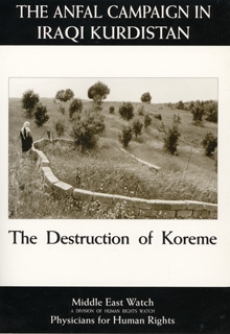| Éditeur : Middle East Watch | Date & Lieu : 1993, New York |
| Préface : | Pages : 116 |
| Traduction : | ISBN : 0-300-05757-1 |
| Langue : Anglais | Format : 115x225 mm |
| Code FIKP : Liv. Ang. 2495 | Thème : Politique |
|
Présentation
|
Table des Matières | Introduction | Identité | ||
 Versions
The Anfal Campaign in Iraqi Kurdistan Just as the Iran-Iraq War was coming to an end in 1988, the Iraqi government and army embarked on a vengeful campaign against Kurdish villagers living in Iraqi Kurdistan. Taken from a Koranic verse, Anfal refers to "the plunder of the infidel," and evidently was intended to give the campaign the veneer of religious justification, though the Kurds themselves are Muslim, and Iraq is a secular state. Using a similarly destructive pattern throughout northern Kurdistan, the Iraqi army first attacked a chosen village...often with chemical weapons...captured the villagers as they tried to flee, then pulverized their dwellings. Many villagers were later killed. The Kurdish village of Koreme serves as a case study of this campaign, showing how the policies implemented by the government of Saddam Hussein were carried out in a single village. Some of Koreme's captured men and boys were executed on the spot; the remainder were taken to a local army fort or Bath Party office where they disappeared while in the hands of security agents. Surviving Koreme villagers,.starving women, children and the elderly... were transferred by truck to bleak camps lacking any provision of food, water, shelter or medical attention. There they were abandoned. Middle East Watch and Physicians for Human Rights conclude that the Iraqi government's Anfal campaign, constituting murder, forcible disappearance, involuntary relocation, the refusal to provide minimal conditions of life to detainees, chemical weapons attacks against civilians, and the physical destruction of Kurdish villages, are at a minimum, crimes against humanity- Ultimately, they may form the basis for a case of genocide. | |||||
| INTRODUCTION
This report was written by Kenneth Anderson, director of the Arms Project of Human Rights Watch, and edited by Andrew Whitley, executive director of Middle East Watch, a division of Human Rights Watch; Aryeh Neier, executive director of Human Rights Watch; Kenneth Roth, deputy director of Human Rights Watch; and Eric Stover, executive director, Physicians for Human Rights. It was reviewed by Jemera Rone, counsel to Human Rights Watch, and Mostafa Khezry and Joost Hilterman, consultants to Middle East Watch. Luis B. Fondebrider. Mr. Fondebrider is a founding member of the Argentine Forensic Anthropology Team (Equipo Argentino de Antropologia), which has conducted exhumations of the graves of the disappeared in Argentina and throughout Latin America. The Argentine Forensic Anthropology Team's forensic evidence was regarded as crucial in securing convictions of several members of the Argentine police and military. Mr. Fondebrider has also worked on forensic exhumations in Chile, El Salvador, Guatemala, and other places. James Briscoe, forensic team archaeologist. Mr. Briscoe is an archaeologist with Roberts/Schornik C Associates, Inc. of Oklahoma. He has extensive experience conducting archaeological digs in the Americas. The forensic team is grateful to Roberts/Schornik C Associates, Inc. for making Mr. Briscoe available for an extended period of time in Iraqi Kurdistan. It is also grateful to Roger Burkhalter for his assistance with computer graphics. Mercedes Doretti. Ms. Doreui is a founding member of the Argentine Forensic Anthropology Team. She has undertaken forensic exhumations in Argentina, Chile, Guatemala, the Philippines and, most recently, in El Salvador where she has been engaged in unearthing victims of the El Mozote massacre of December 11, 1981. Isabel M. Reveco. Ms. Reveco is a founding member of the Chilean Forensic Team (Grupo de Antropologia Forense de Chile). The Chilean Forensic Team has conducted forensic exhumations in cases resulting from the 1973 Pinochet coup against the government of Salvador Allende and subsequent repression by the security forces. Stefan Schmitt. Mr. Schmitt, a German national residing in Guatemala, is a founding member of the Guatemalan Forensic Team (Grupo Antropologia Forense de Guatemala). The Guatemalan Forensic Team, with the assistance of forensic teams from elsewhere in Latin America, has recently begun work exhuming victims of Guatemala's security forces in the Guatemalan highlands. | ||||